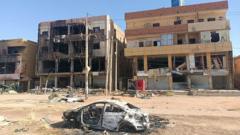The Sudanese military has claimed complete victory over the paramilitary Rapid Support Forces (RSF) in Khartoum state, marking a significant turn in the ongoing civil war that has ravaged the region.
Sudan's Army Declares Total Victory Over Rebels in Khartoum State

Sudan's Army Declares Total Victory Over Rebels in Khartoum State
Military announces clearance of Rapid Support Forces from capital after prolonged conflict
The military's declaration asserts that "Khartoum State is completely free of rebels," as reported by the Sudan News Agency. This announcement follows nearly two months after the military conquered Khartoum city, marking a pivotal triumph that included the capture of the presidential palace. Amidst these developments, hostilities continue to plague the surrounding areas, particularly in the city of Omdurman, where clashes reignited earlier this week. The military has indicated that it launched a "large-scale offensive" to eliminate remaining RSF forces in the region.
Historically, Khartoum was the center of Sudan's governance; however, military leaders have been compelled to relocate to Port Sudan following their loss of control. Port Sudan, previously seen as a bastion of safety, became embroiled in conflict when it faced drone strikes, which the army has attributed to the RSF, exacerbating infrastructure issues and triggering essential resource shortages like water and electricity.
The conflict has further strained Sudan’s diplomatic ties, particularly with the United Arab Emirates (UAE), which stands accused of backing the RSF—a claim the UAE vehemently denies as "unfounded allegations." The war has resulted in catastrophic humanitarian consequences, with thousands dead and millions displaced, leading to one of the world's most severe crises. Both the army and RSF have faced accusations of committing war crimes, which they contest.
In other coverage, insights delve into the ongoing dynamics of Sudan's civil war, the devastating impact on its capital, and the complex web of international relations affecting the situation.
Historically, Khartoum was the center of Sudan's governance; however, military leaders have been compelled to relocate to Port Sudan following their loss of control. Port Sudan, previously seen as a bastion of safety, became embroiled in conflict when it faced drone strikes, which the army has attributed to the RSF, exacerbating infrastructure issues and triggering essential resource shortages like water and electricity.
The conflict has further strained Sudan’s diplomatic ties, particularly with the United Arab Emirates (UAE), which stands accused of backing the RSF—a claim the UAE vehemently denies as "unfounded allegations." The war has resulted in catastrophic humanitarian consequences, with thousands dead and millions displaced, leading to one of the world's most severe crises. Both the army and RSF have faced accusations of committing war crimes, which they contest.
In other coverage, insights delve into the ongoing dynamics of Sudan's civil war, the devastating impact on its capital, and the complex web of international relations affecting the situation.




















